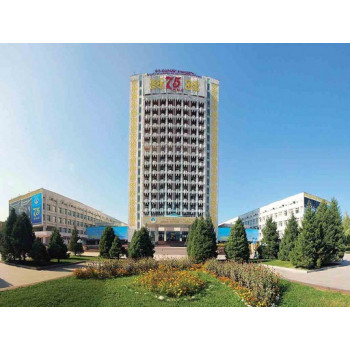Kazakh national University named after al-Farabi

University named after al-Farabi was established in the most difficult years of the last century — there was hunger, lack of jobs, wars and other tragedies, brought family discord and loss. Formally the first University was established in 1928 in Kazakhstan, however, the school only called the University, but did not match. So our University can be called the first higher education institution in the Country. The remainder of the 30-ies of the 20th century had three departments — chemical, foreign languages, and Philology. All the difficult years that led the University Fyodor Trofimovich Olikov.
In 50-ies started the war and postwar vostanovlenie of the economy. The war is not spared, and KSU — I had to train specialists to be sent to the front. By 1945 went to the front of almost 300 people, and returned only one. In the first years of the war was a very difficult situation for the residents of the country and the University as a whole. In Kazakhstan arrived evakuirovali and the University was forced to place them in the walls, therefore, it does not have enough space for teaching. But this process had its advantages — in the University began to bring teachers from Moscow, Kiev and Leningrad. The recovery after the war and further construction of the buildings took people a very long time. KSU confidently began to develop and took a leading centre for solution of acute problems of preparation of qualified personnel. The end of the war increased the number of students in 1946, there were 977 students they taught in 14 specialties.
In 1948 he formed the main part of the teachers who lectured the greatest scientists of the USSR and known to all Mukhtar Auezov and Kanysh Satpaev. Study in these years was interesting, because remember that time as an era of achievements. Scientists of Kazakhstan for the first time traveled abroad to receive higher education, began the heyday of Amateur.
The period from 1961 to 1970 was characterized by significant progress in science and technology. Was the first flight into space, the University acquired new goals and objectives associated with the establishment of well-equipped educational and scientific infrastructure of the University. But one of the main factors of these years was the creation of a residential and academic complex Kazgugrad, its parameters are not inferior to the current campuses of universities. Improved and rilisnya conditions of employees by 1969 was built six houses 400 apartments and our staff received housing. Overall, it was kind of like a Institute town, thanks should have said contractors Kazgugrad. KSU has started cooperation with universities in various countries in Asia, Middle East, Cuba. In 1975, the University was accepted to the University Association.
Since 1991, the University began to carry the name of the great thinker Abu Nasyr Ibn al-Farabi. Since 1993 Decree of the President of Kazakhstan acquired the status of Autonomous self-governing state University. The first steps were taken to training and the creation of new scientific infrastructure.
As a result, it is extremely difficult for the country years, the University has confirmed its survival and mobility, demonstrated leadership paving the way to the top and 16 September 2003 in Bologna, he first signed an agreement and entered into the European educational space. In 2006, the University received the award of the President of the Republic of Kazakhstan for achievements in the field of quality education. Continued recruitment of students and extension faculty.
Now Kazakhstan needs a skilled workforce competitive on the global labour market. Therefore, the Head of state before the national universities and, above all, Kazakh national University as a leading University is fundamentally new challenges. These include the adoption of international quality of training, full integration into the world educational space and recognition of Kazakhstani diplomas, eradication of corruption, worthy of entry into international University rankings.
In order to achieve such high accomplishments, in may last year, the academic Council adopted proposed by the rector of the new University's development Strategy for 2009-2011. It is based on three 'pillars' - a radical modernization of all levels of management, completion of full transition to world standards of training of specialists and improvement of scientific and innovative infrastructure with efficient connectivity to its scientific and National innovation systems in the country. And the best thing is that the Strategy is based on a systemic vision of the University, their interactions not only among themselves but also with the 'external environment' - the state, society, labour market, scientific and innovative system of Kazakhstan.
This strategy is successfully implemented. Made the transition from the formal Declaration to complete the practical implementation adopted in the world practice of credit system of education based on powerful computer-communication the INTRANET. Its main advantage is not only in a higher level of automation of educational process management. It literally 'wakes up' the initiative of students and their direct interest in the outcome of learning. Today, every student becomes a true Creator of the future specialist, he forms the variable part of the training programme, for which it needs a fairly solid vision of a future career and the demands of employers. Another important aspect of this technology is that it provides daily and well-protected control over the actions of each teacher and student. The influence of the exam on the final assessment is significantly reduced, and the main focus (around 60%) done on the current performance that brings life to the adage 'no pain, no pull fish from the pond.' And the student, not working all semester just to get a high rating, though no tangible benefits to offer to the examiners. In conjunction with the openness of the system for remote access of the University administration and even the student's parents it creates a whole new level of protection against corruption.
